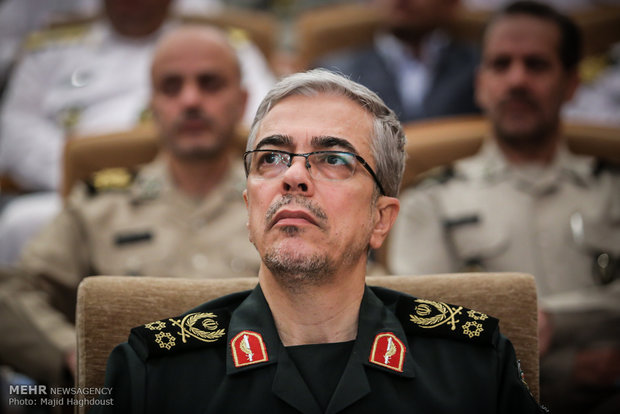Chief of Staff of Iran's Armed Forces Major-General Mohammad Hossein Bagheri said on November 9 that Iran is ready to peacefully resolve the border dispute between Kyrgyzstan and Tajikistan.
IRNA says Major-General Bagheri held phone talks with the Kyrgyz Defense Minister Lieutenant-General Baktybek Bekbolotov and discussed significant issues in the region on Wednesday.
Referring to the particular attention of the 13th government in Iran to promoting cooperation with neighboring nations and the Central Asian region, Iranian general said that given the balanced and good relations between Iran and Kyrgyzstan, the Armed Forces of the Islamic Republic of Iran is ready to develop defense cooperation in various educational, operational and intelligence aspects with Kyrgyzstan.
Appreciating Kyrgyz government's positive vote for Iran on joining the Shanghai Cooperation Organization (SCO), Gen Bagheri highlighted that given the border disputes between Kyrgyzstan and Tajikistan in September, the Islamic Republic of Iran has always stated its readiness for any assistance in peaceful resolution and prevention of any conflict.
Pointing to the issue of sending Iranian drones to Tajikistan, he underlined that Ababil 2 drones have only reconnaissance capability and are not equipped with weapons and offensive equipment, added that the Iranian Armed Forces have always emphasized the Tajik Armed Forces should not use Ababil 2 drones in the border disputes against Kyrgyzstan.
Kyrgyz Defense Minister Baktybek Bekbolotov, for his part, stated that political relations between the Islamic Republic of Iran and the Kyrgyz Republic are based on bilateral relations and trust, adding that the Armed Forces of the Republic of Kyrgyzstan is ready to develop cooperation with the Armed Forces of the Islamic Republic of Iran.
Recall, Major-General Mohammad Hossein Bagheri visited Dushanbe in May this year. On May 17, he and Tajik Defense Minister Sherali Mirzo reportedly launched the first production line for Iranian unmanned military aerial vehicle (UAV) Ababil-2.
Highlighting Iran’s progress in drone technologies in recent years, Bagheri said in the event, “Today, we have reached a position that apart from fulfilling the domestic needs, we can export military equipment to the allies and friendly countries in order to strengthen security and sustainable peace.”
It is to be noted that many border areas in Central Asia have been disputed since the Soviet Union's collapse in 1991. The situation is particularly complicated near the numerous exclaves in the volatile Ferghana Valley, where the borders of Kyrgyzstan, Tajikistan, and Uzbekistan meet.
In the latest border clashes between Tajikistan and Kyrgyzstan that occurred on September 14-17, both sides reportedly lost over 100 people both military population and ordinary citizens. During fierce armed confrontations, a lot of schools, mosques were destroyed in addition to the houses of civilians; administrative buildings were also attacked by fire.
According to border residents, the conflict erupted on September 14 between the Tajik and Kyrgyz border guards and subsided and flared up intermittently for three days.
The latest armed confrontation was the worst since April 2021, when over 50 citizens of both nations died during the armed hostilities.




